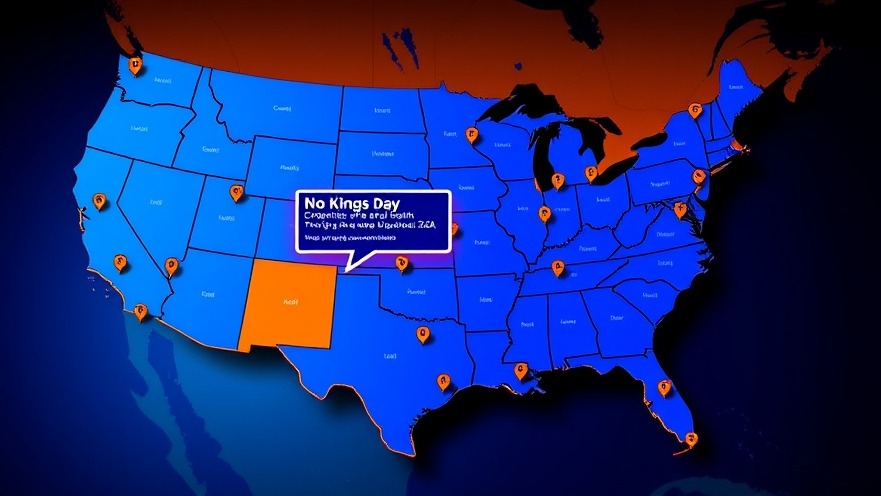
The Birth of No Kings Day: A Symbolic Rebellion
The upcoming protests in Houston, dubbed "No Kings Day," represent more than just dissent against President Trump; they symbolize a collective stand against perceived authoritarian governance. Scheduled for Saturday to coincide with Trump’s 79th birthday and a military parade commemorating the U.S. Army’s 250th anniversary, the demonstrations have attracted national attention. Organizers are advocating for democracy and human rights while calling out policies they view as detrimental to the democratic fabric of the nation.
Why This Day Matters: Insights into Collective Action
No Kings Day is particularly poignant this year, as it taps into the broader national sentiment regarding authority and governance. The protest's timing isn’t coincidental. The juxtaposition of Trump’s birthday celebrations with the call for defiance highlights a stark contrast: a celebration of individualism versus the appeal for collective rights. The day's events serve as a significant reminder of the power of civic engagement and the role it plays in shaping political discourse.
The Historical Context of Civil Dissent
Throughout American history, significant protests have been catalyzed by moments perceived as unjust or undemocratic, such as the Stonewall Riots in 1969 and the Civil Rights Movement. No Kings Day joins this legacy, echoing past movements that rallied citizens around shared values of justice and equality. These events showcase how grassroots activism can spark national conversations, encouraging individuals to reflect on their civic duties within a democracy.
Local vs. National Perspectives on the Protests
While No Kings Day is planned as a nationwide protest, its impact will undoubtedly resonate more significantly within local communities like Houston. The city has a history of vibrant activism, reflecting its diverse population and political engagement. Local participants recognize the importance of their voices in shaping national conversations and are determined to challenge policies they believe undermine democratic values.
Future Predictions: The Path Ahead for Political Activism
The anticipated turnout at the Houston protests highlights a growing trend of increased political engagement among younger generations. As the nation grapples with the ramifications of division in political ideologies, events like No Kings Day signal a resurgence in grassroots political organization. Activism may evolve with the advent of technology, but its core remains the same: people’s desire to influence policy and stand up for their beliefs.
Emotional Resonance: The Human Aspect of Political Engagement
Protests like No Kings Day are not just political statements; they represent the emotional struggles faced by individuals grappling with current events. Many participants view their involvement as a form of empowerment—an opportunity to express their concerns openly. The shared experience of protest fosters camaraderie, highlighting the collective pain, hopes, and aspirations that catalyze social movements.
Conclusion: How You Can Get Involved
For those interested in supporting the ideals behind No Kings Day, attending the event is just one way to engage. Participants can educate themselves on the issues at stake, volunteer with local organizations focused on democratic engagement, or simply unite with their community to discuss and share perspectives concerning current political climates. Civic activism is vital, and every voice matters in contributing to the democratic process.
The "No Kings Day" protests in Houston and across the country reflect a pivotal moment in American civic life. As individuals take to the streets in solidarity, they remind us that democracy thrives with active participation. To stay informed about developments and future events that inspire democratic action, follow local news platforms or engage with community organizations that advocate for civic rights.
 Add Element
Add Element  Add Row
Add Row 



Write A Comment